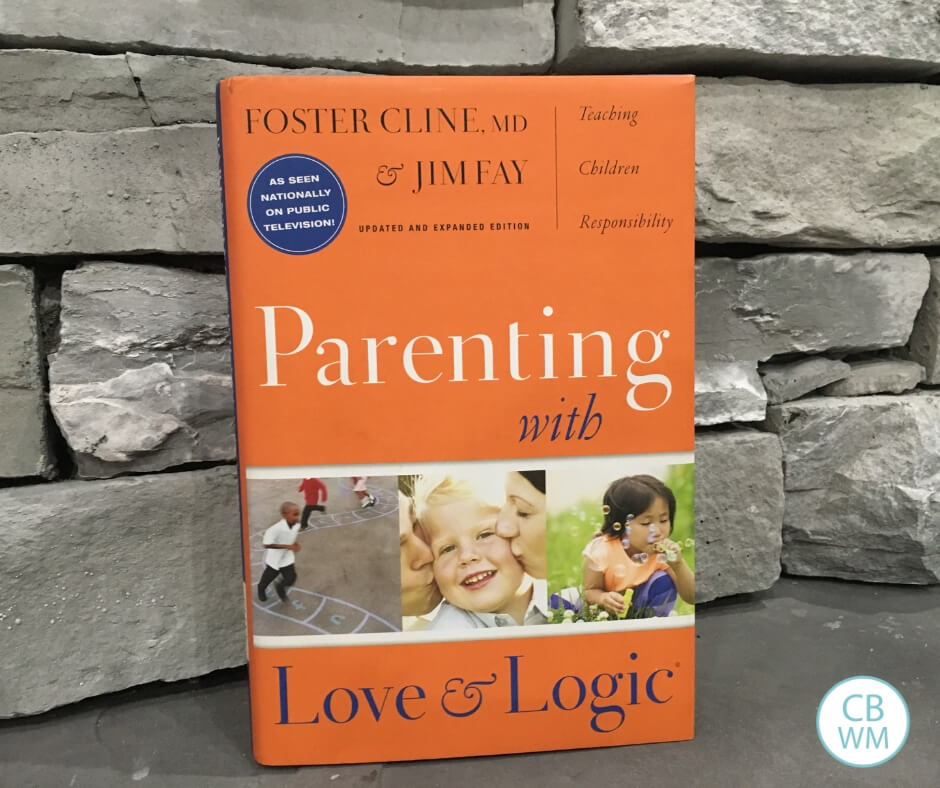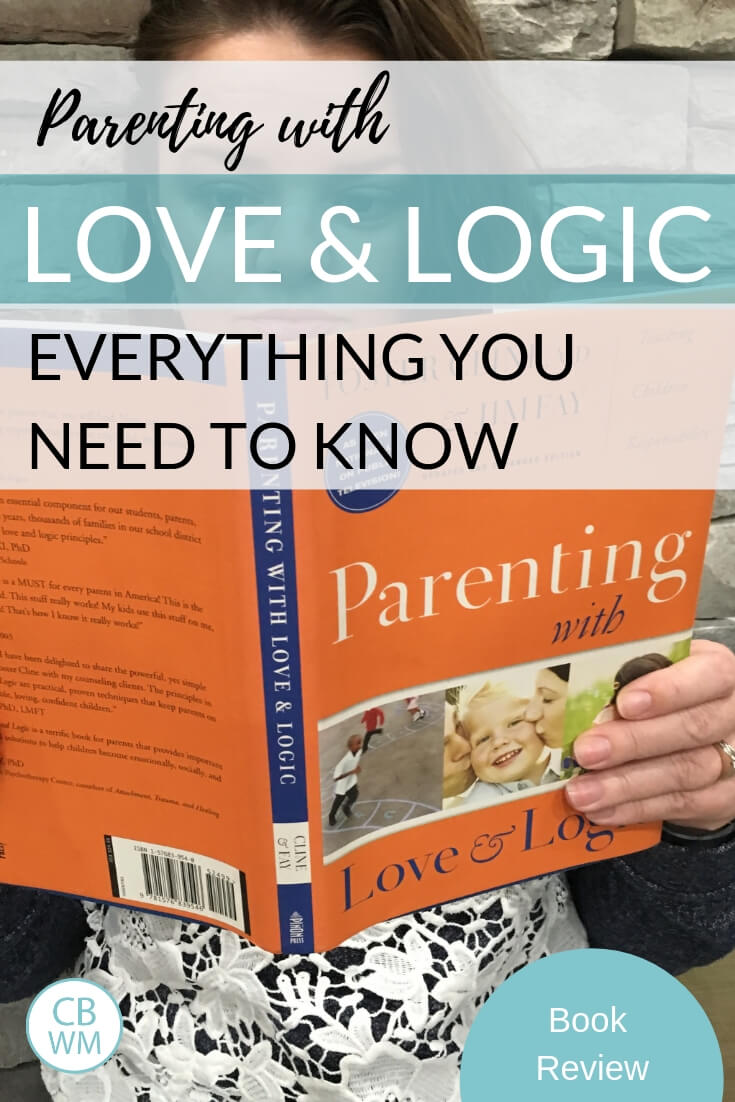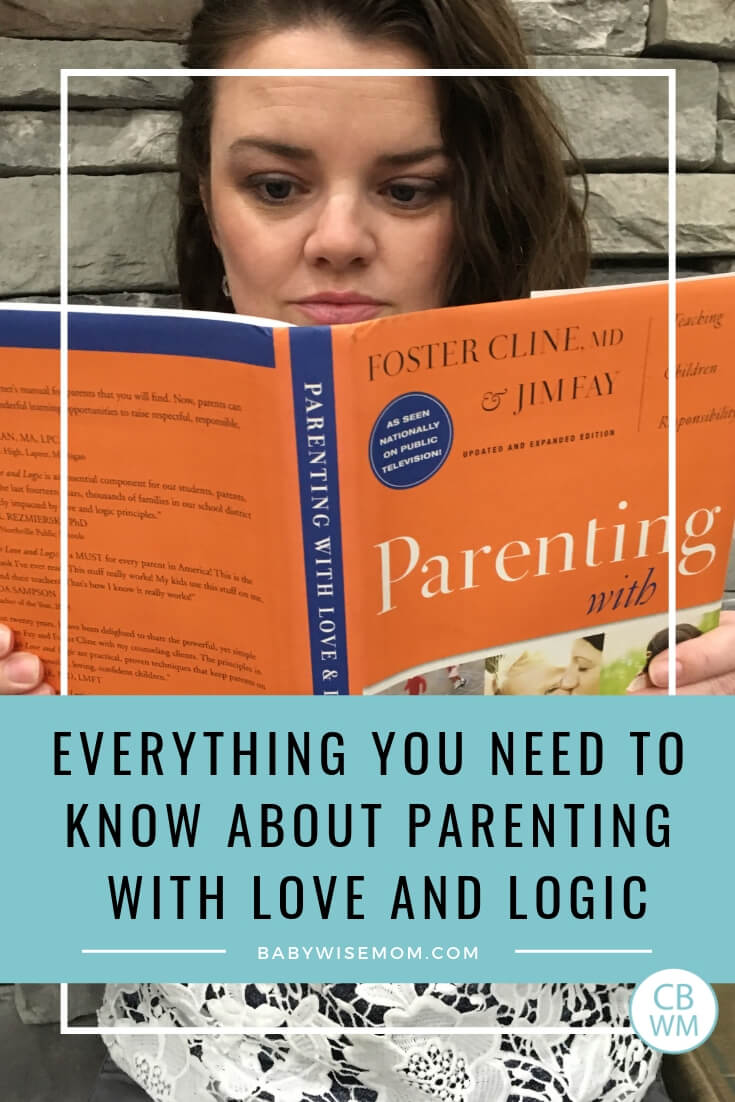Everything you need to know about Parenting With Love and Logic by Foster Cline and Jim Fay. Parenting with Love and Logic summary and review.

When Brayden, my oldest child, was a baby, one of my best friends told me I needed to read Parenting With Love and Logic by Foster Cline and Jim Fay. She didn’t have children yet, but she was a teacher and absolutely loved the Teaching With Love and Logic version of the book.
I have always been eager for good resources as a parent, so I purchased the book. When Brayden was a young toddler, I started to read it. She was right! It was a great book.
Now, of course, there are things in the book I do not agree with or follow. I think that is to be expected with most parenting books out there. The only way you would agree with everything in a parenting book is if you were the author. We all have slightly different views. You just take what you love and ignore what you don’t.
I find the book to be super helpful to get me in a frame of mind where I allow my child to experience consequences in life. I step back and think before acting or reacting. I keep a level head and look at the big picture of life rather than that exact moment. It is a super helpful parenting book. Let’s discuss everything you need to know about this book.
Post Contents
Parenting With Love and Logic Summary
The Love and Logic book begins by talking about enjoying parenting. It then goes on to talk about the goal of raising responsible kids. This is really the heart of the book. Raise children to be independent, capable, and responsible adults. I have a friend who often says, “We are raising future adults.” Remember that.
Failure is not always bad. Success is not always good. Protecting your child from consequences, failure, and hurt is not always helpful nor the best parenting choice.
The book then goes on to talk about the positive outcome of responsible children. It discusses self-concept, self-esteem, and how to praise and encourage effectively.
Read: 7 PHRASES THAT HELP YOU AVOID LOSING YOUR TEMPER AS A PARENT
The book then goes on to discuss mistakes. Allowing children to try. Allowing children to fail. This also allows children to succeed. It talks about bailing children out–good idea or bad?
There is then a full section on boundaries and limits. How to discipline without empty threats. How to set boundaries that can stand.
The next section discusses control. There can often be a battle of wills between parent and child. Learning how to manage the struggle for control can be super helpful for parents.

We then go into consequences. How to allow children to experience consequences. How to have empathy while also allowing consequence to happen in your child’s life. The importance of empathy when allowing consequences.
The second section of the book focuses on all sorts of scenarios and how to practice love and logic with all of these situations. Things like allowance, bedtime, chores, seatbelts, fighting, friends, homework, pets, sports, stealing, sassing, school, teeth brushing, and more. There are 48 topics covered, so it really helps you to know how to handle a myriad of situations.
Parenting With Love and Logic Review
As I said earlier, I really, really like this book. Again, not everything is something I agree with. But it just gets me in the frame of mind for allowing for consequences, being calm and logical, and feeling confident in your discipline. If you need help knowing how to give logical consequences, this book will help you.
Another great thing is the love aspect of this book. The logic helps you do all of the above. They also focus on love. How do you teach consequences and let natural consequences happen while still showing love? You want your child to grow up understanding grace. This book helps you strike that balance.
The premise is you allow your child to make choices. You require that your child experience the consequences of that choice. You focus on your child learning that actions have consequences while the child is young and the “stakes are low.”
While you do this, you empathize with your child when something is hard. You don’t say, “Well, you decided to not wear a coat so you deserve to be cold. I told you so.” You say, “That is really sad you are cold. Too bad you didn’t wear a coat. I bet next time, you will choose a coat.”
The love and the logic work together.
There are things I don’t love in the book. Many things are not stated that I think should be taken into context.
One thing that is never discussed is the idea of parenting in the funnel, as is discussed in Babywise II and on up.
There are certain consequences, I believe, that need to be applied only when age-appropriate.
The book has an example they use over and over about a coat in the winter. It says not to force your child to wear a coat. He will get cold and then wear it next time.
Well, my son never would have done that at age two. When he was two, the rule was he didn’t go out without a coat, hat, and gloves. He hated all of the above. He would have preferred to go out and just be freezing cold.
By age three, he happily wore all of that and even asked for it.
You have to keep age-appropriateness in mind when reading Love and Logic. You can’t expect logic to prevail in a child who is not yet logical.
I believe natural consequences work for my son, but I do think you need to teach your child some sort of standard first.
I don’t think you should just have them go through life learning consequences as they go. I think you owe it to your child to pass on your knowledge before you turn them loose on the world.
It reminds me of the phrase “don’t reinvent the wheel.” If I had just had Brayden go out and get cold, how would he know that a coat is available and would help him to stay warm?
By setting the rules first and requiring him to wear a coat, he saw there was value. Wise people learn from the mistakes of others. While all of us have our “unwise” moments, I don’t think we should just put our kids out there without our wisdom.
Conclusion
I highly recommend you read this book. It will help you to be able to discipline confidently, with love. When a problem arises, you will confidently allow your child to experience the consequences from the choice. It is not easy to allow children to experience the consequences they have walked into, but it has so much value long-term. You can read my more first-impression review of Parenting With Love and Logic book here.

Related Posts:
- Benefits of Teaching Consequences
- LOGICAL CONSEQUENCES: HITTING AND BITING
- Logical Consequences: Public Tantrums
- LOGICAL CONSEQUENCES: SAYING “NO” WHEN GIVEN DIRECTION
- Logical Consequences: The Diaper Change
- Logical Consequences: Throwing Toys
- Logical Consequences: What Was Mis-Used
 Parenting With Love And Log...Shop on Amazon
Parenting With Love And Log...Shop on Amazon
